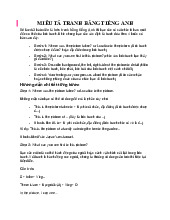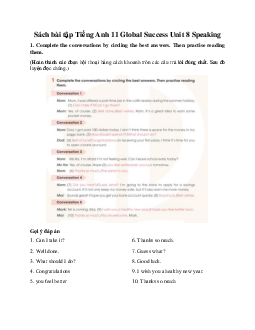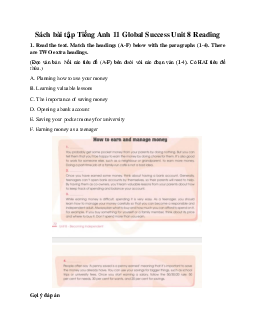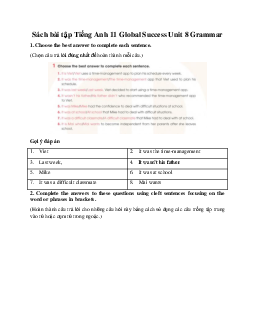



Preview text:
Tiếng Anh 11 Global Success Unit 8 Communication and Culture/ CLIL Everyday English
Expressing best wishes and responding
(Thể hiện những lời chúc tốt đẹp và phản hồi)
1. Listen and complete the conversations with the expressions in the box. Then practise them in pairs.
(Nghe và hoàn thành các cuộc hội thoại với các biểu thức trong hộp. Sau đó thực hành chúng theo cặp.) Gợi ý đáp án 1. B 2. D 3. C 4. A
2. Work in pairs. Use the models in 1 to make similar conversations for these
situations. One of you is Student A, the other is Student B. Use the expressions below to help you.
(Làm việc theo cặp. Sử dụng các mô hình trong phần 1 để thực hiện các hội thoại tương
tự cho các tình huống này. Một trong số các bạn là Học sinh A, người kia là Học sinh B.
Sử dụng các biểu thức dưới đây để giúp bạn) Gợi ý đáp án
1. A: Hi, I'm a bit nervous about the upcoming exam.
B: Don't worry, you got this! I know you've been studying hard and you're well-prepared. Good luck!
A: Thank you! I really appreciate your support.
B: No problem at all. Just do your best and everything will work out.
2. A: Hey, how are you feeling today?
B: Not too great, I'm feeling a bit sick.
A: I'm sorry to hear that. I hope you feel better soon. B: Thanks, I appreciate it.
A: Is there anything I can do to help?
B: Just your kind words and good wishes are enough to make me feel better. Thank you. Culture
Teen independence in the US
(Sự tự lập của thanh thiếu niên ở Mỹ)
1. Read the text below and complete the diagram. Use no more than THREE words for each gap.
(Đọc đoạn văn dưới đây và hoàn thành sơ đồ. Sử dụng không quá BA từ cho mỗi chỗ trống.) Gợi ý đáp án 1 - English 2 - sports, clubs 3 - fast-food, restaurants 4 - local hospitals
2. Work in groups. Discuss the following questions.
(Làm việc nhóm. Thảo luận các câu hỏi sau.)
Do American teenagers learn to become independent in the same way as Vietnamese
teenagers? What are the similarities and differences?
(Thanh thiếu niên Mỹ có học cách tự lập giống như thanh thiếu niên Việt Nam không?
Các điểm giống và khác nhau là gì?) Gợi ý đáp án
In terms of similarities, both American and Vietnamese teenagers may seek to become
more independent during their teenage years. They may also work part-time jobs or
engage in community service activities.
In terms of differences, the cultural and educational contexts in which American and
Vietnamese teenagers grow up can play a significant role in shaping their experiences
and expectations for independence. For example, the emphasis on individualism in
American culture may be different from the emphasis on collectivism in Vietnamese
culture. Additionally, the education systems in the two countries may have different
approaches to promoting independence and self-direction.
Ultimately, the ways in which American and Vietnamese teenagers learn to become
independent may depend on a variety of factors, including cultural norms, family
dynamics, education, and personal experiences.




